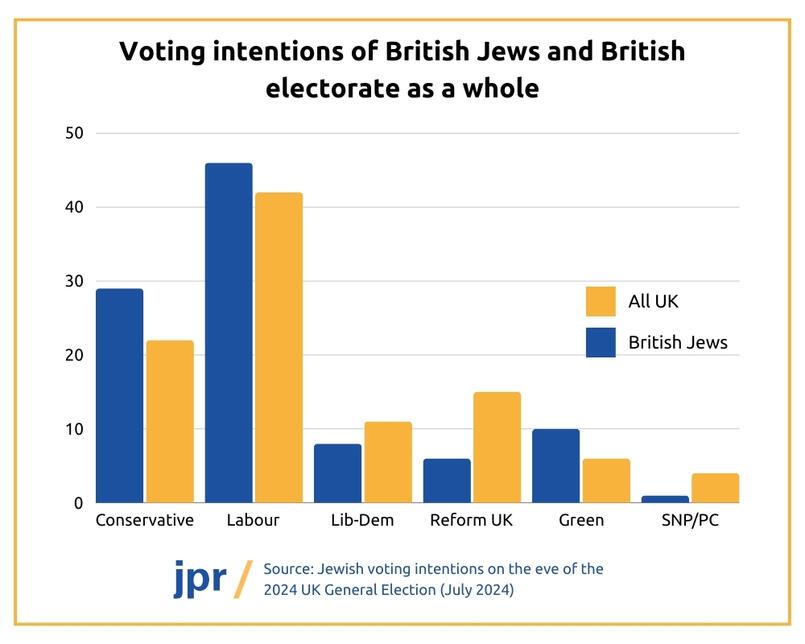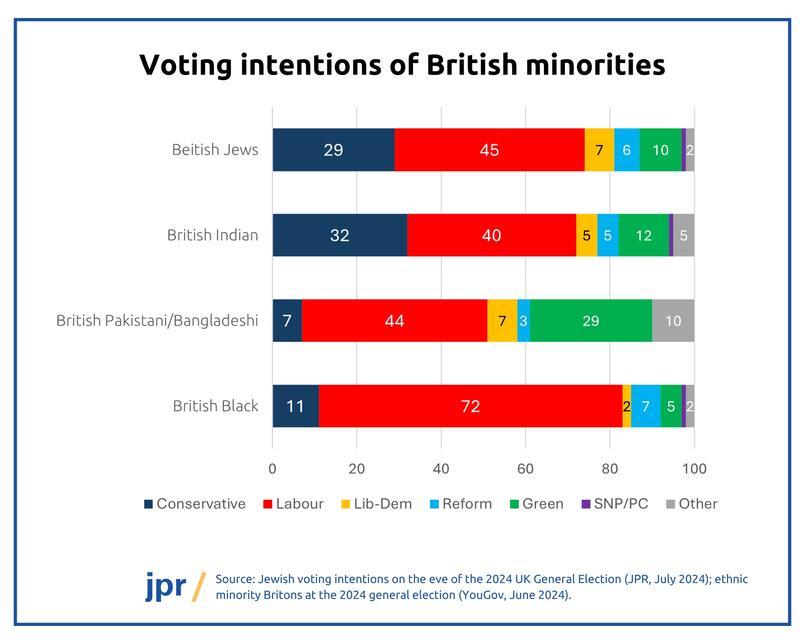Jews in the UK are not too different from the general UK population when it comes to voting. How do they compare with other minority groups in the country?
Dr Daniel Staetsky
Dr Daniel Staetsky
The recent UK General Election saw the Labour Party win the majority of seats in the Parliament, with 411 seats compared to the Conservatives’ 121, and the Liberal Democrats winning 72. It is worth noting that the UK’s regional elections system means that the large gap in the results shrinks when looking at the overall share of votes (popular vote), with about 34% of voters choosing Labour, 24% voting for the Conservatives, 14% voting for Reform UK and 12% for the Liberal Democrats.
Still, the results clearly show that the British electorate decided to show its discontent with the ruling Conservative Party. However, it’s not just Labour that gained from the deteriorating popularity of the Conservatives; a new political force, Reform UK, positioned itself as an alternative to the Conservatives among right-wing voters. Though their 14% national support did not translate into more than five seats in the new Parliament, their stance on immigration, British values, law and order, economics and woke culture was attractive to many of those who wished to see a similar political programme carried out by the Conservative party.
Just before the elections, the Institute for Jewish Policy Research released a report on Jewish people’s voting intentions based on the responses of over 2,700 members of the JPR Research Panel between 16-20 June 2024. When we compared their voting intentions to those of the British electorate as a whole, it turned out that Jews are not too different from the general UK population, perhaps more inclined to vote for one of the two ‘big’ parties.

British Jewish voting preferences have changed dramatically over the past five years in a way that resembles the change seen in the general British population, with growing disenchantment with the Conservative Party. In the 2019 election, about 60% of British Jews voted for the Conservatives, and only 11% voted for the Labour Party, led by Jeremy Corbyn. Since Corbyn’s demise, many traditional Jewish Labour voters felt it was ‘safe’ to vote for the party again; combined with those who grew disappointed with the Conservative government, Jewish voting intentions look much like the rest of the country.
Unlike the general population, only 6% of Jewish voters supported Reform UK. This lower proportion might be because right-wing Jewish voters feel uncomfortable voting for a populist far-right party and chose to ‘remain’ with the Conservatives despite their discontent.
Still, 6% of British Jews supporting Reform UK is not a negligible figure and might even seem surprisingly high for a party not precisely known for its support for minority rights. But it shouldn’t be a surprise: when looking at other minorities’ voting intentions, it seems that Reform UK is equally popular. In a survey conducted by YouGov, 7% of ethnic minority voters declared they intended to vote for Reform UK.

One can see similarities and differences even by glancing at these results. All minority groups surveyed support Labour more than Conservatives. British Black voters’ support for Labour is strikingly high. The voting pattern of the Indian minority, the closest minority to Jews in terms of their socioeconomic positioning in Britain, is remarkably similar to the one exhibited by Jews.
What could explain these differences in supporting the Conservative Party? I have suggested in the past that the British Jewish vote is class-based, in the sense that the Jewish vote, and mainly its support of the Conservative Party, reflects Jews’ socioeconomic standing in the UK today. The similarity of the Jewish and Indian voting intentions in July 2024 lends further support to this hypothesis.
Senior Research Fellow and Director of the European Jewish Demography Unit
Senior Research Fellow and Director of the European Jewish Demography Unit
Daniel holds a PhD in Social Statistics and Demography from the University of Southampton and a Master’s degree in Population Studies from the Hebrew University...
Read more